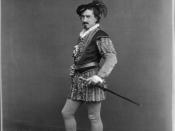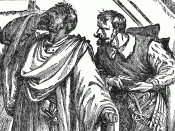ShakespeareÃÂs Othello is considered an outsider within renaissance Venice. He is an outsider who is clever and certain in military matters but is socially insecure. He is demonized by the European society because of his fixed ideas, racial and cultural differences. Within the play, Othello is portrayed as the stereotypical alien, mistrusted and feared for his black skin and ethnic characteristics. Throughout the play he is constantly referred to as ÃÂthe MoorÃÂ. When others call him ÃÂblackÃÂ, they refer to his physical stature but also to the idea of symbolism within Elizabethan principles: White is honour, black is wickedness; white is innocence, black is guilt. The use of animal imagery is also used by Iago to help express Othello as a fiend and the choices of animalÃÂs shows the underlying racial discrimination: ÃÂOld Black ramÃÂ and ÃÂBarbary horseÃÂ. In addition to this the references to witchcraft and the devil emphasise OthelloÃÂs differences: ÃÂThe devil will make a grandsire of youÃÂ, ÃÂthe beast with two backsÃÂ.
However at the same time Othello is considered to be an ÃÂinsiderÃÂ as he is respected and honoured by those in authority for his disposition and for the services he performs for Venice yet the wider society are xenophobic. These positive impressions are reinforced in the Council chamber when Brabantio presses charges against Othello for marrying his daughter Desdemona, a young European woman. Through marrying her Othello develops a sense of belonging with the white population yet, OthelloÃÂs lack of experience with love has left him poorly prepared for marriage. Brabantio complains that witchcraft must have been used as she has fallen in love ÃÂwith what she feared to look onÃÂ. Othello then proves his innocence and abstinence from black magic by retelling the tale of their love with genuine eloquence...
![From the Library of Congress: TITLE: Thos. W. Keene. Othello CALL NUMBER: POS - TH - 1884 .O7, no. 1 (C size) [P&P] REPRODUCTION NUMBER: LC-USZC6-58 (color film copy transparency) RIGHTS INFORMATION: No known restrictions on publication. MEDIUM: 1 print (](https://s.writework.com/uploads/9/94760/library-congress-title-thos-w-keene-othello-call-number-pos-thumb.jpg)

